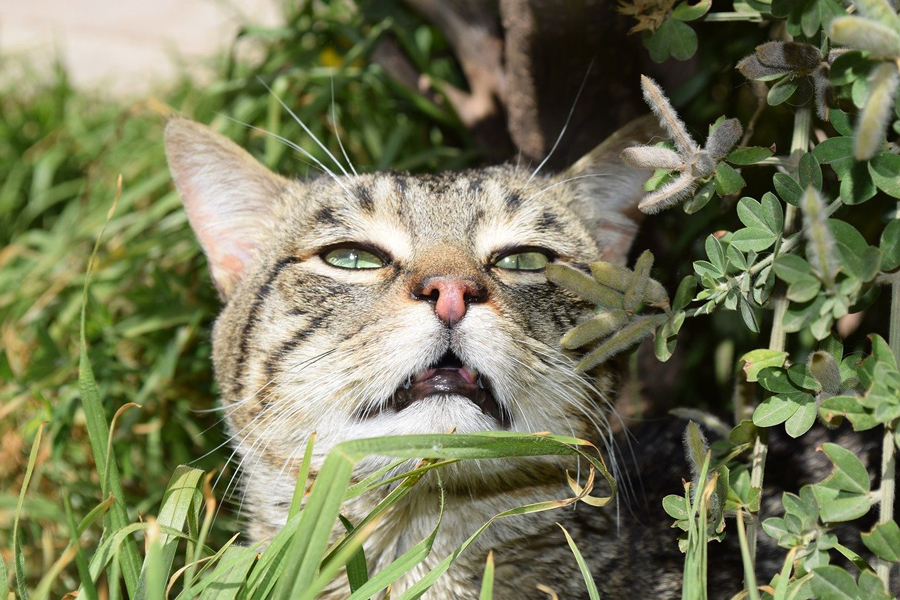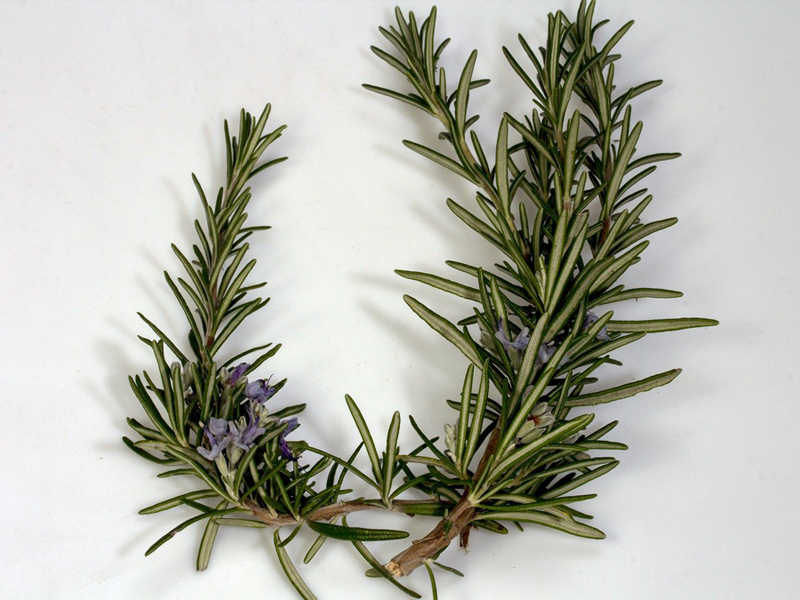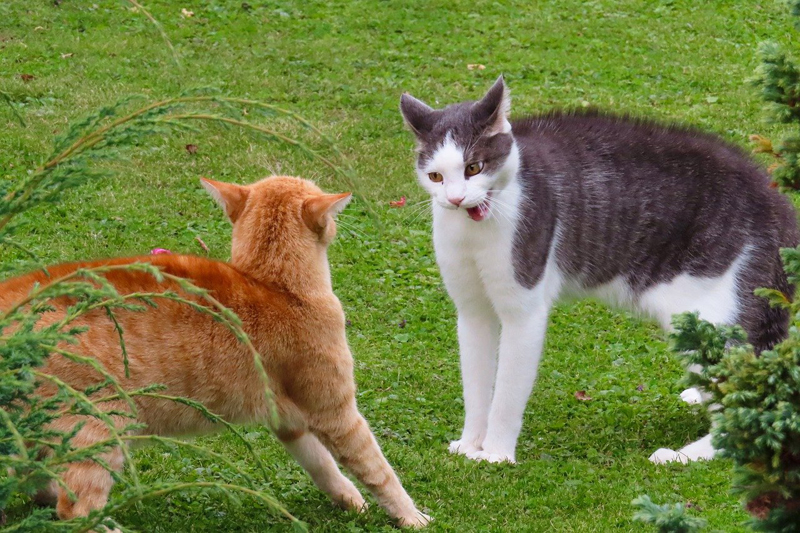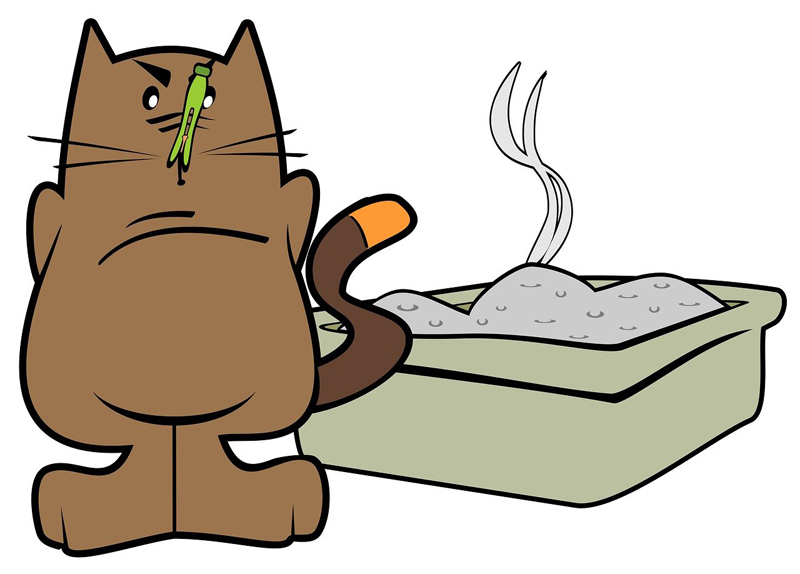This post may contain affiliate links. This means I may receive a small commission if products are purchased through them. All opinions are honest and remain my own.
If you have ever tried to keep cats out of your yard, or away from a certain area of your house, you know that it can prove challenging. You may have considered some type of cat repellent and found yourself wondering, “what smells do cats hate?”

Smell is one of the most effective ways to deter cats away from specific areas because in the world of cats, smell is everything. It is one of the most important ways that they interact with and understand the world around them.
A Cat’s Amazing Sense of Smell
A cat’s sense of smell is one of, if not the most powerful tool in his arsenal. I was surprised to learn that cats actually have a very poor sense of taste. They have only 470 taste buds compared to a human’s 9,000. To make up for this weakness, cats have an extra amazing sense of smell. While a human averages about 5 million odor receptors in their nose, a cat has 200 million, making their sense of smell 40 times stronger than ours.
Another really interesting fact about cats is that they have a second area of scent receptors along the roof of their mouths. It’s called the vomeronasal organ, or Jacobson’s organ (named after the Danish physician who is credited with having discovered it around 1811.)
This extra organ is why you sometimes see cats leave their mouths open for a weird amount of time after catching wind of something. That move is called the Flehmen’s response, and it allows cats to take in additional scent information related to sexual, feeding, and social behaviors.
Usings Scents to Deter Cats
Because a cat’s sense of smell plays such a key role in guiding their actions, using scents they dislike to create cat-free zones is a no brainer. But how do we use scents to deter cats exactly? What are the smells that cats hate and which ones work the best?
Let’s begin by listing and explaining the smells that cats typically find offensive. We’ll explore common ways to use these scents as cat deterrents, as well as which ones might work the best in specific situations.
This isn’t a 100% complete list, as there are tons of smells out there that cats don’t love, but these are the most commonly agreed upon and the ones you’ll be most likely to run into.
Smells That Cats Hate
1. Citrus

While the bright scent of citrus fruit such as oranges, lemons, and limes may be heavenly to our human noses, cats tend to avoid it at all costs. Because their sense of smell is so much more powerful than ours, fresh citrus scents (especially oranges) are overbearing to cats.
This aversion to the tart fruit family can be used to our advantage. If you’re having trouble keeping a cat out of your garden, try sprinkling fresh orange peels around the perimeter. You can also use citrus juice in homemade cat repellent sprays, which we’ll get to a little later.
2. Lavender

Another smell that is lovely to humans but said to be unpleasant for cats is lavender. It’s not certain whether this really works to deter cats, but if it does, it would have to be within very close proximity. For this reason, you could try planting lavender densely around the perimeter of your yard to keep cats at bay.
Lavender, along with MANY other plants, is technically toxic to cats if consumed in large quantities. But as they typically steer clear of the floral scent, this is highly unlikely to happen. For a complete list of plants that are toxic and nontoxic to cats, check the American Society for the Prevention of Cruelty to Animals (ASPCA) website.
The thing that you have to be careful with and that is definitely toxic to cats is lavender essential oil. In fact, any essential oil containing phenols can be poisonous to cats because they lack the enzyme that is needed to process them. Since cats have thin, delicate skin, essential oils can quickly penetrate it and get into their bloodstream.
(Scroll to bottom for list of essential oils known to be toxic to cats.)
3. Rosemary

Rosemary is a great plant to keep around areas of your house or yard that you’d prefer to remain cat-free. It’s not toxic to cats, and since they don’t care for the heavy fragrance rosemary emits, they will probably leave it alone.
Plus, if you enjoy cooking, rosemary is a great herb to keep on hand and works beautifully in many dishes.
4. Banana

This one surprised me, as bananas aren’t the first thing that comes to mind when wondering what smells cats hate. For whatever reason (some believe it’s due to the potassium) many cats seem to have an aversion to the pungent smell of bananas and their peels.
To keep a cat away from a particular piece of furniture, try rubbing a banana peel on it. It sounds strange, but people have experienced success with it!
5. Cinnamon

Like other foods and seasonings with very strong, spicy scents, it’s generally agreed upon that cats don’t care for cinnamon. However, like lavender, if consumed in large quantities cinnamon can technically become toxic to cats. It’s probably better to be safe than sorry and keep cinnamon away from your pets.
Read also: The Ultimate Guide on People Food Cats Can (and Can’t) Eat
6. Vinegar

Vinegar smells strongly to us humans, so imagine how off putting it must be to a highly sensitive cat nose! Unlike other substances, vinegar is safe to use around cats and can be added to homemade repellent sprays.
If undiluted vinegar is too strong for your household or plants, try diluting it with one or two parts water. Experiment with different strengths to find the ratio that is strong enough to repel cats but not so strong it will wilt leaves or bleach fabrics.
7. Unfamiliar Cats

Everything on this list so far can be taken with a grain of salt, because while specific food and plant scents may be a turn off for many cats, others seem to take no notice of them. But one thing that all cats DEFINITELY hate is the smell of an unfamiliar feline in their territory.
This is well known to any cat parent, and can cause significant stress for your cat if it happens a lot. Cat clashes can also result in fights and serious injuries. It’s best to keep cats indoors unless you are outside with them keeping an eye on them, to minimize any contact with strays or roaming neighborhood felines.
8. Predator Urine

Another thing that will most certainly repel cats is the scent of a predator’s urine. The scent of natural predators such as wolves, coyotes, and foxes will send cats running in the opposite direction. But how to come by such a product?
Believe it or not, there is a website called the Predator Pee Store that has been selling various types of predator urine online since 1986! Wolf urine is said to work well to keep cats out of your garden or shed. You could also put some around the entire perimeter of your yard to keep out unwelcome prowling kitties.
9. A Dirty Litter Box

Cats are very fussy about their litter boxes. They really prefer to go in a clean bathroom area every time, just as we do. If the litter box gets too dirty, they may find somewhere else to go, which would be very bad indeed!
Keep multiple litter boxes around the house (one for each cat, plus at least one extra) and make sure to keep them all clean and scooped every day. Also, avoid floral scented litters as some cats may not care for it.
What smells are safe to use as cat deterrents?
The problem with researching what smells are safe to use as cat deterrents online is that I’ve noticed many of the websites that come up first in search results are actually telling you to use ingredients that can be harmful to cats (such as essential oils.)
Now, I may be overly paranoid, but when it comes to the health and wellbeing of cats I think it’s better to err on the side of caution.
Below is a recipe for a homemade cat repellent that is SAFE, yet effective.
Homemade Cat Repellent Recipe
- White vinegar
- Lemon juice
- Rosemary (fresh is best but dried is OK too)
Mix all ingredients into a spray bottle and shake to combine. Ratios are not really important because all of these ingredients are cat repellents. Spray around areas you wish to remain cat-free, such as fence posts, garden perimeters, doorways, etc.
If your cat repellent spray is not working, the answer may not necessarily be to use more potent ingredients. There are many other safe and effective methods to keep cats out of unwanted areas, such as cat scat mats, chicken wire, and mulch.
Read also: How to Stop Cats From Scratching the Carpet
List of Essential Oils Harmful to Cats

Essential oils are very popular right now. People use them in diffusers, rub them on their skin, put them in baths, and ingest them into their bodies (edible essential oils only.) Just be careful when using them, as they are incredibly powerful. Consult with your veterinarian if you’re unsure if your particular use of an essential oil may pose a health risk to your cat.
The following are some essential oils that are known to be toxic to cats:
- Tea tree
- Lavender
- Cinnamon
- Bergamot
- Peppermint
- Ylang Ylang
- Eucalyptus
- Citrus
- Pennyroyal
- Sweet birch
- Pine
- Clove
- Wintergreen
Summary
Cats, like humans, are incredibly complex and sensitive beings. Not all scents will affect every cat in the same way. But there are a few things that most people agree are not cat’s favorite smells – citrus, lavender, rosemary, banana, cinnamon, vinegar, unfamiliar cats, predator urine, and a dirty litter box. Use caution and get on the phone with your vet if you’re ever unsure whether or not a particular substance or smell may be harmful to your cat.
If you enjoyed this article and found it helpful, check out some of our related posts:
9 Cat Proofing Ideas for a Happier Life

Leave a Reply